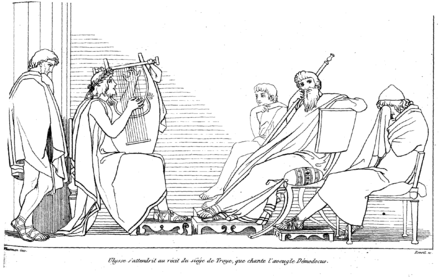$ 0.000 -0.03%
Odyssey (OCN) Rank 4919
| Mkt.Cap | $ 134,990.00 | Volume 24H | 0.00000000OCN |
| Market share | 0% | Total Supply | 0.00000000OCN |
| Proof type | N/A | Open | $ 0.000014 |
| Low | $ 0.000013 | High | $ 0.000014 |
Themes of The Odyssey
The so-called character development is basically as old as literature itself, but it functions quite differently from time to time. In the Odyssey, it is basically a manifestation of, or a focus on, something that is already there, and not the emergence of a totally new characteristic. It's clear Odysseus made both good and bad decisions along the way, but such is human life. Through Odysseus's 20-year journey, we find the makings of an epic hero that all can gain inspiration from. His tragic flaw adds to his heroic nature, leading us to believe he was, in fact, a hero.

By the end of the epic, he seems much more willing to temper pride with patience. Disguised as a beggar, he does not immediately react to the abuse he receives from the suitors. Instead, he endures it until the traps he has set and the loyalties he has secured put him in a position from which he can strike back effectively.
What are the bad character traits of Odysseus?
However, along with Odysseus' heroic qualities, the Odyssey also reveals three major flaws of his. Prime amongst these are: arrogance, unfaithfulness, and stubbornness. The first flaw of Odysseus that causes several setbacks in his endeavor to get back home is hubris (excessive pride).
Polyphemus catches them and eats some of Odysseus' men. The Cyclops prays to his father Poseidon that Odysseus would get home to Ithaca and if he was fated to make it home, Odysseus would lose all of his men, his ship and find trouble at home.

Suitors descend on Penelope's home attempting to win her hand. Regardless of her feelings toward them and her belief that Odysseus will return to her, she demonstrates hospitality by allowing the suitors to stay in her home and do whatever they want. To do anything less, even to the worst house guests, would be against her moral code. Also, the suitors are much more powerful than she and her son.
Later, the families of the suitors come to kill Odysseus for revenge. The goddess Athena helps Odysseus by making them stop and give up the fight. Odysseus actually lays claim of defeating Troy with no due respect to divine hands as Athena who promised from the onset to stay by his side. Odysseus' wits may have contributed significantly to the defeat of Troy but simply disregarding the efforts of his numerous compatriots is a clear evidence of his self-conceitedness. Athene, goddess of wisdom and daughter of Zeus, begs her father to allow Odysseus to return home at last, for he has languished for seven years on the isle of the nymph Calypso, who holds him captive.
When did the Iliad take place?
Penelope is the wife of the main character, the king of Ithaca, Odysseus (Ulysses in Roman mythology), and daughter of Icarius of Sparta and his wife Periboea. She only has one son by Odysseus, Telemachus, who was born just before Odysseus was called to fight in the Trojan War.

Nearby words of odyssey
Having thus been forced to join the army, Odysseus in turn forced Achilles, who disguised as a girl was hiding in Scyros (the island in the Aegean Sea northeast of Euboea), to do the same. For that purpose, he used a trumpet, reasoning that a girl would not react to its sound as a man does. "… For nothing is greater or better than this, when man and wife dwell in a home in one accord, a great grief to their foes and a joy to their friends; but they know it best themselves." (Odysseus to Nausicaa. Homer, Odyssey 6.180).
Homer

How would you describe Odysseus?
The Odyssey is Homer's epic of Odysseus' 10-year struggle to return home after the Trojan War. While Odysseus battles mystical creatures and faces the wrath of the gods, his wife Penelope and his son Telemachus stave off suitors vying for Penelope's hand and Ithaca's throne long enough for Odysseus to return.
Odysseus finally returns to Ithaca, where he disguises himself as a beggar. Together they kill the suitors, who are trying to marry Penelope in order to gain his kingdom.
How does Odysseus as a character change?

At the same time, his wife Penelope has to fight off a lot of men who want to marry her; and his son Telemachos searches for him. In The Odyssey, what are some examples that prove that Odysseus is arrogant? I already have the part of when Odysseus yells his name to the Cyclops. In Odysseus's absence, his wife, Penelope, has been plagued by destructive suitors, and his son, Telemachus, has grown up.

And to avenge his son, the god decided to make Odysseus' journey even harder. Other examples of great loyalty come from Odysseus' household and family. Telemachus, Odysseus' son who was only a baby when his father left for the war, goes on an expedition to try and learn any information he can on his wayward dad. He also stands beside his father and murders all the suitors, never questioning the reasons for this terrible punishment. Even Odysseus' faithful servants, Eurycleia and Eumaeus, who have been with him since his youth, remain loyal.

- In Odysseus's absence, his wife, Penelope, has been plagued by destructive suitors, and his son, Telemachus, has grown up.
- In The Odyssey, what are some examples that prove that Odysseus is arrogant?
- Odysseus takes some men with him to get water and provisions from the neighboring land.
- The first is during the adventure with the Cyclops in book 9.
- The hero of the poem is Odysseus, or Ulysses as he is called in Latin; the poem is mythological, not historical.
Is Odysseus a Hero? - Character Analysis

What does the sirens song in the Odyssey mean?
In this mythological postscript, Odysseus is accidentally killed by Telegonus, his unknown son by the goddess Circe. After Odysseus' death, Telemachus returns to Aeaea with Telegonus and Penelope, and there marries Circe. Telemachus: The son of Odysseus and Penelope (Hom.
Having caught sight of a wisp of smoke rising up from the countryside, they sent three messengers, only to discover that the inhabitants intended to eat them for supper. When Odysseus and their men realised their plight, they tried to escape. But the Laestrygonians, who now appeared in great numbers, began pelting the fleet with huge rocks, and harpooning the men. Only Odysseus' ship and his crew could escape for having brought the ship to rest outside the cove. This is how the largest part of Odysseus' army and fleet was destroyed.
The SUITORS OF PENELOPE were about one hundred, but Odysseus, helped by his son and two servants, managed to kill them all. Many of them he killed with the bow that Iphitus1 once had given him.
However, when the Cyclops, being drunk, was asleep, Odysseus and his men blinded his single eye. Polyphemus2 in despair cried to the other Cyclopes for help. But when they came and asked who was hurting him, he told them that Nobody had hurt him (for Odysseus had told him that he was called so), and the Cyclopes retired. This is how Odysseus and his comrades could escape the cave of Polyphemus2. But while sailing away Odysseus teased the Cyclops and was cursed by him, who called upon his father Poseidon.
The goddess Athena causes Penelope to feel the need to display herself, and fan the flames of the suitors' desire. The poem is the story about Odysseus's ten-year-long voyage home to Ithaca after the Trojan War.[1] The Trojan War is the subject of the Iliad.
Essay about Comparing The Epic of Gilgamesh with The Odyssey
And when none of them could bend it, Odysseus took it and shot down the SUITORS, being helped by his son Telemachus, Eumaeus1 (his servant and swineherd) and Philoetius, a master-herdman in Ithaca. After the Aeolian Islands, Odysseus and his men came to the land of the Laestrygonians, a cannibal people ruled by Antiphates2. In this strange land, nightfall and morning are so close to each other that shepherds bringing in their flocks at night are met by other shepherds driving out their flocks at dawn.
His own servants, when he appears as a strange beggar at the end of the story, offer Odysseus food and comfort because those who are hospitable and kind to guests receive great rewards from the gods. The Odyssey follows its hero and protagonist Odysseus as he fights to get home after the Trojan War, a war that lasted an entire decade.
This reluctance was defeated by Palamedes, the envoy of Agamemnon, who appeared in Ithaca to remind Odysseus of the oath. On the occasion Odysseus feigned madness to avoid joining the coalition, but Palamedes, by threatening to kill Odysseus' son Telemachus with his sword, forced him to confess that his madness was pretended, and he consented to go to war.
The crew wants to take these items and leave at once (having learned their lesson with the Cicones); however, Odysseus wants to stay and see who lives there and what kind of guest-gift he might receive from his host. So they stay, and experience the horrors of watching the Cyclops, Polyphemus, eating six of their men and being blinded, all because Odysseus wants his gift. The question is interesting, but one has to take into consideration the principles and the basic characteristics of the Homeric epics before attempting to answer it sufficiently.
It can also be argued that Odysseus himself shows great loyalty because he perseveres for ten years to make it home. Loyalty, as in devotion to helping those close to you, is also a major theme in The Odyssey.
The cyclops Polyphemus eats some of Odysseus' men and holds the rest captive. Odysseus engineers an escape and winds up blinding the cyclops as revenge. On his journey home, Odysseus lands on the island of the Cyclops Polyphemus. They go inside his cave at the sight of sheep, cheese and milk.
More about Conflict in The Odyssey Essay
Mentor4, or rather Athena in his likeness, appeared several times to help Telemachus to take action. Odysseus' fate was, at that time, unknown to Telemachus, and Odysseus' home was threatened by the SUITORS OF PENELOPE. During this period Telemachus, looking for news about his father's fate, visited Menelaus and Nestor. Telemachus took part in the killing of the SUITORS OF PENELOPE. Later Odysseus and his men arrived to the land of the Cyclopes, who resemble the CYCLOPES but are not quite the same. There, he and part of his crew were trapped by the Cyclops Polyphemus2, who devoured some of his comrades, and promised Odysseus to eat him last as a reward for the wine he had received from him.
In its origin it was an oral epic poem from Mycenaean Greece, about the 11th century BC. The hero of the poem is Odysseus, or Ulysses as he is called in Latin; the poem is mythological, not historical. One of my favorite moments that shows Odysseus' arrogance is when he decides to go against Circe's advice in Book 12 of The Odyssey. When Odysseus finally packs up to leave Circe's palace, she gives him instructions to follow so he will continue on safely. An epic poem, ascribed to Homer, that describes the journey of Odysseus after the fall of Troy.








